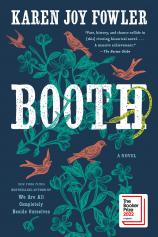Booth
Review
Booth
Critically acclaimed and bestselling author Karen Joy Fowler returns almost a decade after WE ARE COMPLETELY BESIDE OURSELVES with BOOTH, an intimate yet kaleidoscopic portrait of the family behind one of the most hated men in American history: John Wilkes Booth, President Abraham Lincoln’s assassin.
“What happens to love when the person you love is a monster?” writes Fowler in her author’s note. This question --- and the focus on this love rather than its recipient --- forms the heart of this ambitious, nearly 500-page novel. Like so many victim advocates have reminded us to do, Fowler sets her writerly gaze not on Booth, but on his victim and those victimized by his act: his loving, dysfunctional family.
Presided over by Junius Booth, an esteemed Shakespearean actor, the Booth family’s history begins in 1822 on a secluded farm 30 miles northeast of Baltimore. Magnetic and mercurial yet undeniably talented, Junius is an eccentric: he considers eating meat a sin, he praises the “Hindoos” as the possessors of the only true religion, he believes that no man can be owned, and his penchant for liquor encourages him to act out these beliefs (and more) in varying states of inebriation and madness. The Booth matriarch, Mary, is a dark-haired beauty whose passion for Junius is eclipsed only by her tragic life as a mother. Between the two of them, the Booths conceive 10 children, only six of whom live beyond childhood.
"The history is written beautifully and, at its best, does what only the strongest historical fiction can do: capture the details of a time vividly and place the reader in the mind of someone living in that time authentically."
The children are Junius “June,” more brawn than brains, his father’s greatest disappointment; Rosalie, the family’s built-in nanny, who bears witness to the worst of her siblings’ deaths and her mother’s grief; Edwin, sensitive and quiet, with the most beautiful eyes; Asia, headstrong and stunning; John “Johnny” Wilkes, the apple of his family’s eye; and Joseph Adrian, nearly an afterthought. The youngest, Johnny and Joe, seem almost inconsequential, divided from their older siblings by four tragic deaths and years of grief and upheaval. Yet, as we all know, it will be Johnny who makes the family’s name synonymous with death.
BOOTH contains six “books,” each of which is divided into chapters focused on one of the Booth children. Rosalie sets the scene in Book 1. Through her eyes, we watch as Junius Sr.’s career takes off in fits and starts, both propelled and halted by his alcoholism. Unstable and prone to angry outbursts, Junius is still beloved by his family, raising them with a love for nature so strong that to even pluck a flower on his property is akin to murder. But with his career taking off, Junius is gone for nine months each year, leaving Mary and Rosalie to nurture, parent and raise the remaining children.
With Mary still reeling from the losses of four of her kids, Rosalie devotes herself to keeping the family together, becoming a sort of third parent to the young ones. Raised in a household steeped in Shakespeare, many of them dream of becoming actors, yet their father will hear none of it, demanding instead that they choose stable, honest careers. This dissonance is not the first of his idiosyncrasies to plague their mental and emotional states, but it is perhaps one of the most formative.
The older children are much more like their father when it comes to spiritual and political beliefs. The younger ones have been raised in almost entirely different families, so changed were the Booths by wealth and access to better schooling, homes in the city and the loss of older siblings to guide them. June and Edwin become celebrated actors, while Rosalie turns into a spinster-fied version of their mother, and Asia is a budding flirt. As the older brothers venture farther away from the Booth home, Johnny and Joe grow up without the same influences. As a result, Johnny turns rebellious, while Joe is nearly forgotten at school. Johnny’s nature is a quiet current throughout the book, one that runs so naturally and unimpeded that his family cannot see it for the portent that it is until it’s far too late.
Fowler never goes so far as to excuse John Wilkes Booth, but her writing of the historical context is so immersive and perfectly distilled that his actions seem inevitable --- if not because of the instability and difficulty with alcohol that binds his family, then for the tensions brewing nationwide over slavery, immigration and the rights of states. As war becomes a reality, Johnny starts siding firmly with the South on each of these issues. That he stands against the rest of his family is glossed over time and time again in favor of harmony, and with the constant refrain that “the war will be over soon anyway.” (If you’re hearing echoes of “He was always a quiet boy” or “We never could have expected this,” you’re on the right track.)
BOOTH walks the fine line between immersive (at times unwieldy) historical fiction and searing contemporary social horror. The history is written beautifully and, at its best, does what only the strongest historical fiction can do: capture the details of a time vividly and place the reader in the mind of someone living in that time authentically. At its weakest, the prose can be a bit weighed down by cliché and information dumps. That said, the glory of the novel comes from Fowler herself, who does not write down to her readers by drawing overhanded parallels between the divide created by the Civil War and our current political climate.
Early on, when setting the political scene, Fowler writes that Lincoln warned the public of two possible threats to the Republic: the lawless actions of the mob and the inevitable rise someday of an aspiring dictator. She tells us right from the start that “the gravest peril will come if the mob and the dictator unite,” thus setting the stage for both John Wilkes Booth --- radical and mad, but never not loved --- and political figures of our own time. That his family, and the Booth name, was also victim to his madness is an emotionally resonant point that reverberates through both 40 years of Booth history and centuries of America.
Reviewed by Rebecca Munro on March 11, 2022
Booth
- Publication Date: February 7, 2023
- Genres: Fiction, Historical Fiction
- Paperback: 496 pages
- Publisher: G.P. Putnam's Sons
- ISBN-10: 0593331451
- ISBN-13: 9780593331453




